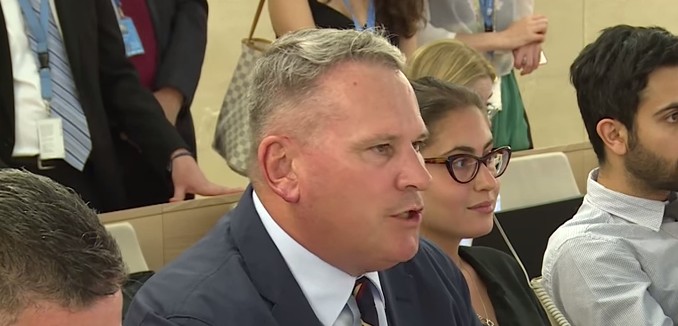A United Nations Human Rights Council hearing on last year’s war between Israel and the terrorist group Hamas was highlighted by testimony on Monday from three military experts who said that the Council’s recently commissioned report on the war would encourage further terrorism.
The three experts were Col. Richard Kemp, former commander of British forces in Afghanistan; Major General Michael D. Jones, former Chief of Staff of U.S. Central Command; and Lt. Col. Geoffrey Corn, the U.S. Army’s former senior expert on the laws of armed conflict.
Kemp’s testimony dealt mostly with Hamas’ tactics, which were designed to maximize civilian casualties. Kemp accused the commision of “validat[ing] and encourag[ing] Hamas’s tactics” by failing to condemn the terrorist group.
Jones was one of the retired American military officers who prepared a study for the Jewish Institute of National Security Affairs, which accused Hamas of “a concerted strategy … to exploit misunderstandings of [Laws of Armed Conflict] to gain international condemnation of Israel.” In his testimony, Jones said that the commission “came to conclusions [about Israel’s guilt] without sufficient information to make a judgment.” He countered that his group, with access to the relevant information, found that Israel applied “lawful” criteria to its targeting decision and “that based on verifiable information on the launch sites, weapons and ammunition storage, command locations, and the trajectories of fired weapons, that Hamas habitually violated the law by attacking civilian targets with no military value, and deliberately placing Gazans at risk without military necessity.”
Corn enumerated the three flaws in the commission’s report, noting that the commission “lacked the foundation” to apply the principles of the laws of armed conflict properly.
First, it treats questionable interpretations of this law as conclusive, and fails to apply the principle of distinction comprehensively. Specifically, it omits assessment of how an enemy’s systemic failure to distinguish himself from civilians, and deliberate exploitation of the perception of civilian status, impacts the reasonableness of attack judgments.
Second, the Report reflects common but invalid tendencies toward “effects based” condemnations of targeting judgments. Combat effects are relevant when considering compliance with the Law of Armed Conflict, but cannot substitute for recreating the context of attack decisions to determine whether they were reasonable. Limited access to operational information may make this process difficult, or even impossible, but does not justify substituting effects as the touchstone of legality.
Third, the Report is not based on credible military operational expertise. This is exacerbated by the tactical context of close combat in an urban environment against an enemy deliberately refusing to comply with its distinction obligation. The Report’s judgments regarding military advantage are attenuated from the true nature of military operations, therefore undermining the credibility of ultimate legality assessments.
The UN Human Rights Council’s report was originally chaired by law professor William Schabas, who resigned in disgrace after it was revealed that he had been a paid consultant for the Palestinian Authority. He was succeeded by Mary MacGowan Davis, a former justice on the New York State Supreme Court.
[Photo: unwatch / YouTube ]




